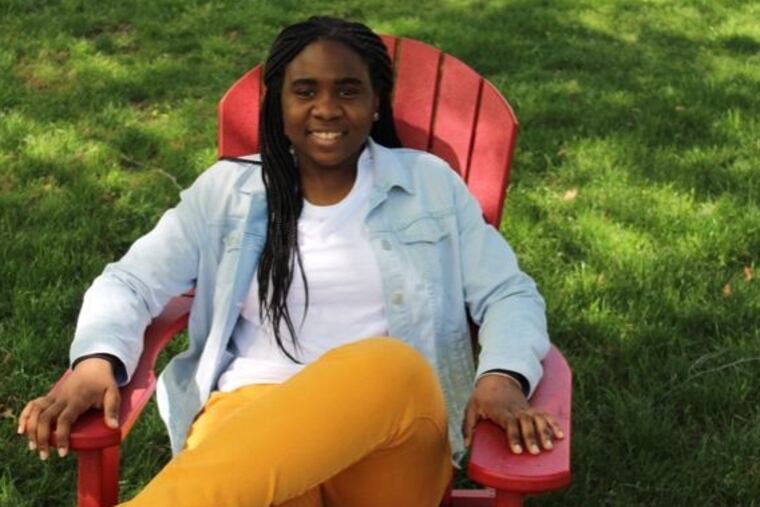Colleges are canceling study abroad for the fall. What does this mean for students?
Dickinson, Villanova, the University of Pennsylvania, La Salle and Widener have canceled study abroad, citing uncertainty about the virus, anticipated travel restrictions, changes to overseas academic programs and worry about another lockdown. They hope students can go in the spring.

Dickinson College student Daisheau Player was looking forward to studying in New Zealand this fall as part of a study abroad program.
But Dickinson informed Player and about 250 other students last month that it had canceled study abroad for the fall semester, concerned about the impact the coronavirus still may be having.
“I was pretty prepared for it,” said Player, 20, a chemistry major from Baltimore. “I felt like that’s what was going to happen. It was just too uncertain. We didn’t know where things would stand weeks from now, much less months from now.”
Dickinson is among a growing number of colleges that have canceled study abroad as the fall semester creeps closer. Villanova, Pennsylvania State, the University of Pennsylvania, La Salle, and Widener have canceled study abroad, citing uncertainty about the virus, anticipated travel restrictions, changes to overseas academic programs, and the potential of sudden new lockdowns if a second wave occurs.
» READ MORE: As the coronavirus spreads to Europe, so does concern on local college campuses
Studying abroad is very popular on some campuses. Nearly 40% of Villanova students and nearly two-thirds of Dickinson’s go abroad at some point over their four years. In 2017-18, nearly 21,000 students in Pennsylvania and 4,688 from New Jersey studied abroad, according to a report by the Institute of International Education.
The virus has taken a large toll, with more than 90% of summer programs canceled, the institute said. And "the COVID-19 health crisis will affect international student mobility in this academic year and possibly for years to come,” the institute said in a recent report.
International educators are hopeful that study abroad will return as conditions improve. In New Zealand, officials this week said the nation had eradicated all cases of the coronavirus and had reopened travel across the country.
After large-scale crises in the past, students have continued to seek study abroad opportunities, said Caroline Donovan White, senior director for education abroad services at NAFSA: Association of International Educators.
“I’m hopeful the importance of international education will be front and center more and more as we work on solving global challenges,” she said.
Most schools said they hope to resume study abroad in the spring, but can’t promise.
“I’ve been telling folks my crystal ball is broken,” said Liz Campanella, director of Villanova’s Office of Education Abroad.
Villanova this fall was scheduled to send more than 200 students to Ireland, Spain, South Africa, Australia, the United Kingdom, and other countries to study languages, do field work, and take classes. But the university noticed some of its overseas partners were withdrawing, Campanella said, and wanted to give students time to make alternate plans.
Ryan Ford, 19, a rising junior from Orange, Conn., appreciated it. He was supposed to study in Ireland and was tired of the uncertainty.
“It was definitely disappointing," the chemical engineering major said. “But it was also a bit of a relief because we didn’t have one more thing hanging over our shoulders anymore.”
Colleges that have canceled said they have room on campus to accommodate the students. Dickinson delayed its housing selection process so study-abroad students could participate. Neither Dickinson nor Villanova has announced whether students will be on campus in the fall or studying remotely.
Dickinson runs the majority of its study abroad programs. Having seen the disruption when more than 155 students had to be brought home in the spring, the college decided not to take that risk again, said Samantha C. Brandauer, associate provost and executive director of Dickinson’s Center for Global Study and Engagement.
“We don’t want to put students back into that position,” she said.
But the college plans to keep ties with faculty and host institutions in other countries in place, and offer virtual global programming to Dickinson students in the fall, she said. Dickinson also is working with Haverford College on some online global learning programming, she said. Some models came out of the spring, when students were forced to finish studies online, she said. Students who had been studying in Bologna, Italy, for example, could log into cooking classes with faculty there.
» READ MORE: Penn, Temple, Rowan among colleges canceling trips, programs abroad as coronavirus spreads
“We were really trying to help our students who had to leave Bologna early stay connected to Italian culture,” she said.
Villanova also is working on virtual exchanges, Campanella said.
Some colleges and universities, including Lehigh, Rutgers and Haverford, haven’t yet pulled the plug on fall study abroad.
“Students are working with Lehigh’s Summer Abroad Office to plan for a few different scenarios for fall,” said spokesperson Lori Friedman.
St. Joseph’s University also has kept it on the table and said about 50 students are exploring options.
At some schools, students made the decision to withdraw.
“Most students who planned to study abroad in fall 2020 have canceled or deferred to later semesters,” said Diane D’Amico, a spokesperson for Stockton University in New Jersey.
At Villanova, more than 80 students pulled out ahead of time.
Player had planned to take courses at New Zealand’s University of Otago. She still hopes to have the chance in the spring. If not, the opportunity could be lost. She isn’t interested in going during her senior year, a time when students are job-hunting and planning for graduate school.
“I just would want to be on campus," she said, "close to all the resources available to me.”